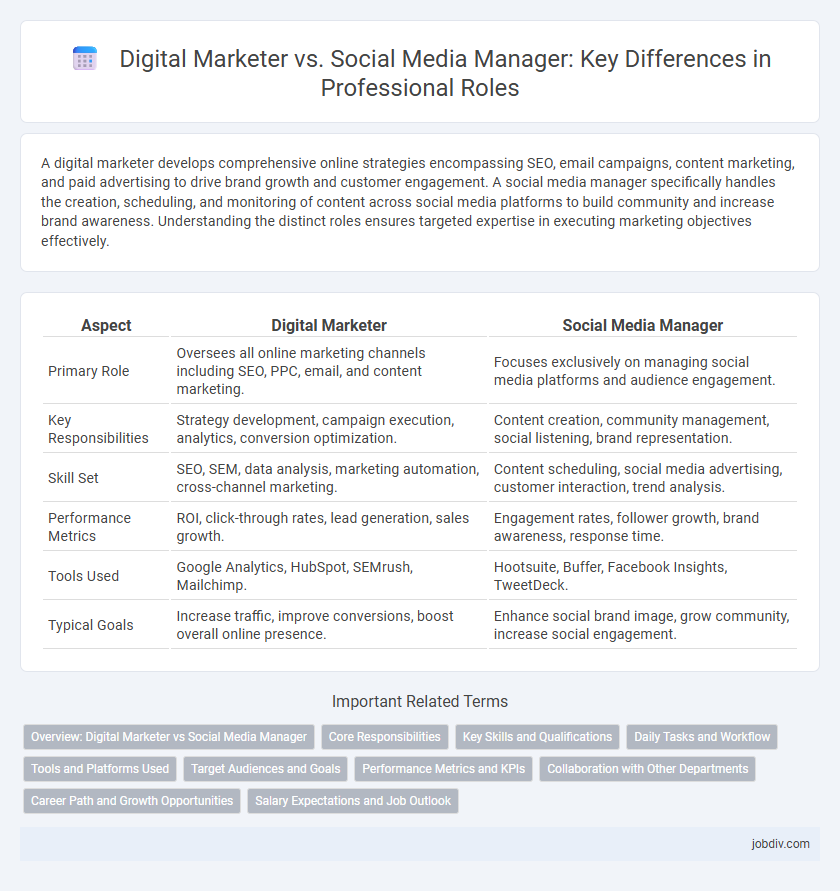A digital marketer develops comprehensive online strategies encompassing SEO, email campaigns, content marketing, and paid advertising to drive brand growth and customer engagement. A social media manager specifically handles the creation, scheduling, and monitoring of content across social media platforms to build community and increase brand awareness. Understanding the distinct roles ensures targeted expertise in executing marketing objectives effectively.
Table of Comparison
| Aspect | Digital Marketer | Social Media Manager |
|---|---|---|
| Primary Role | Oversees all online marketing channels including SEO, PPC, email, and content marketing. | Focuses exclusively on managing social media platforms and audience engagement. |
| Key Responsibilities | Strategy development, campaign execution, analytics, conversion optimization. | Content creation, community management, social listening, brand representation. |
| Skill Set | SEO, SEM, data analysis, marketing automation, cross-channel marketing. | Content scheduling, social media advertising, customer interaction, trend analysis. |
| Performance Metrics | ROI, click-through rates, lead generation, sales growth. | Engagement rates, follower growth, brand awareness, response time. |
| Tools Used | Google Analytics, HubSpot, SEMrush, Mailchimp. | Hootsuite, Buffer, Facebook Insights, TweetDeck. |
| Typical Goals | Increase traffic, improve conversions, boost overall online presence. | Enhance social brand image, grow community, increase social engagement. |
Overview: Digital Marketer vs Social Media Manager
Digital Marketers develop broad strategies encompassing SEO, PPC, email campaigns, and content marketing to drive overall brand growth and lead generation. Social Media Managers focus specifically on creating, curating, and analyzing content across social platforms to increase engagement and build community presence. Both roles require data analysis skills, but Digital Marketers emphasize multi-channel integration while Social Media Managers prioritize platform-specific audience interaction.
Core Responsibilities
A Digital Marketer develops comprehensive online marketing strategies encompassing SEO, email campaigns, content marketing, and pay-per-click advertising to drive brand growth and customer acquisition. In contrast, a Social Media Manager concentrates on managing social media platforms by creating engaging content, monitoring audience interactions, and analyzing performance metrics to enhance brand visibility and user engagement. Both roles require data analysis skills but differ in scope, with the Digital Marketer focusing on broad digital channels and the Social Media Manager specializing in social networking sites.
Key Skills and Qualifications
Digital marketers require expertise in SEO, PPC, data analytics, content strategy, and email marketing to drive comprehensive campaigns across multiple channels. Social media managers focus on community engagement, platform-specific content creation, social media analytics, and brand monitoring to enhance presence on networks like Facebook, Instagram, and LinkedIn. Both roles demand proficiency in digital tools, communication skills, and an understanding of audience behavior to optimize online performance.
Daily Tasks and Workflow
Digital marketers analyze campaign performance, optimize SEO strategies, and manage email marketing to drive traffic and conversions daily. Social media managers create content calendars, engage with audiences on platforms, and monitor social metrics to enhance brand presence. Both roles collaborate closely but diverge in focus: digital marketers emphasize broad online strategy, while social media managers concentrate on community interaction and platform management.
Tools and Platforms Used
Digital Marketers leverage a diverse range of tools such as Google Analytics, SEMrush, and HubSpot to execute comprehensive campaigns across multiple channels, including search engines, email, and paid advertising. Social Media Managers primarily utilize platforms like Hootsuite, Buffer, and Sprout Social to schedule content, monitor engagement, and analyze social metrics on networks such as Facebook, Instagram, and LinkedIn. Both roles require proficiency in data-driven tools, but Digital Marketers emphasize cross-channel optimization while Social Media Managers focus on platform-specific community management.
Target Audiences and Goals
A Digital Marketer targets diverse online audiences using data-driven strategies to optimize conversion rates, encompassing channels like SEO, email, and paid ads. A Social Media Manager focuses specifically on engaging platform-specific communities, cultivating brand loyalty and increasing follower interaction across networks such as Facebook, Instagram, and LinkedIn. While both roles aim to enhance brand visibility and growth, Digital Marketers prioritize broader market reach and sales objectives, whereas Social Media Managers specialize in fostering meaningful audience relationships within social platforms.
Performance Metrics and KPIs
Digital marketers prioritize metrics such as conversion rates, cost per acquisition (CPA), and return on ad spend (ROAS) to evaluate campaign efficiency and drive revenue growth. Social media managers focus on engagement rates, follower growth, and share of voice to measure brand presence and audience interaction across platforms. Both roles analyze KPIs like click-through rates (CTR) and customer lifetime value (CLV) but align these with their distinct strategic objectives.
Collaboration with Other Departments
Digital marketers and social media managers collaborate closely with sales, customer service, and product development teams to align marketing strategies with overall business objectives. They share insights from campaign performance and customer engagement metrics to optimize content and improve lead generation efforts. Effective interdepartmental collaboration enhances brand consistency and drives cohesive digital marketing initiatives across multiple channels.
Career Path and Growth Opportunities
A Digital Marketer typically oversees broad campaigns involving SEO, email marketing, and data analytics, offering diverse growth into strategic roles like Marketing Director or Analytics Manager. A Social Media Manager specializes in content creation and community engagement across platforms, with career opportunities expanding into Brand Manager or Social Media Strategist positions. Both paths provide robust advancement potential, but Digital Marketing offers wider scope for specialization in technology-driven marketing solutions.
Salary Expectations and Job Outlook
Digital marketers typically earn a median salary of $65,000 annually, influenced by their broad skill set in SEO, content marketing, and analytics, whereas social media managers average around $58,000, reflecting their specialized focus on platform engagement and community management. The job outlook for digital marketers projects a 10% growth rate over the next decade due to increasing reliance on digital channels, while social media manager positions are expected to grow by 8%, driven by expanding brand presence across various social platforms. Employers value digital marketers for their comprehensive strategy expertise, while social media managers are prized for real-time audience interaction and brand storytelling.
Digital Marketer vs Social Media Manager Infographic

 jobdiv.com
jobdiv.com